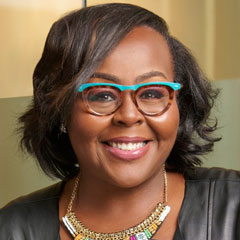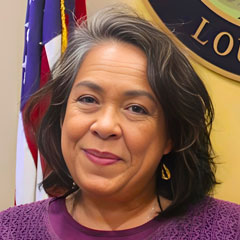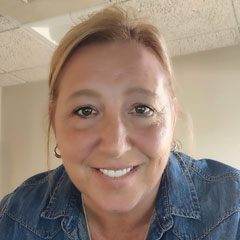NeAngela Dixon and three criminal justice leaders discuss the importance of women being a part of reform efforts in local jails.
Women are changing the way we think about incarceration for the better.
Historically, the criminal justice system—and efforts to improve it—have centered on men. But increasingly women are taking on leadership roles inside and outside of the criminal justice system—as organizers, stakeholders, researchers, data experts, and more.
Women are improving programs and services offered to individuals and communities directly impacted by the justice system; they are helping to increase and improve criminal justice system data and research to shape more effective policies and practices; and they are building pathways for the next generation of criminal justice reformers.
We invited three women leaders to share their work, who are part of the Safety and Justice Challenge and are making an impact today. We asked them each the question: Why is it important for women to be a part of and help lead criminal justice reform efforts?
April Frazier Camara
President & CEO, National Legal Aid and Defender Association

The involvement of women in criminal justice reform is crucial to ensure diverse perspectives and experiences in shaping policies that affect everyone. As a Black woman with loved ones and close friends directly impacted by the system, I bring both my personal background and professional experience as a former public defender to my leadership role at the National Legal Aid and Defender Association.
Women bring unique insights and experiences to the table based on our experiences, and our involvement helps to address issues that may be overlooked in a non-diverse environment, such as the specific needs of women and marginalized communities within the justice system. Women are often attuned to the issues faced by vulnerable populations, including victims of domestic violence, human trafficking, and abuse.
Women are often attuned to the issues faced by vulnerable populations, including victims of domestic violence, human trafficking, and abuse.
In addition, women tend to excel in developing collaborative approaches and community engagement. I pride myself on my listening skills to foster dialogue and authentic partnerships, which can lead to more comprehensive and sustainable reform efforts. Finally, women in leadership positions serve as role models for young girls and women, inspiring them to engage in civic matters and pursue careers in law, politics, and criminal legal reform.
Theresa McKinney
Senior Researcher, Mayor’s Office of Criminal Justice Coordination, City of New Orleans

Criminal legal system reform efforts would grind to a halt without the participation and leadership of women. In Orleans Parish, we are present and integral at every level and in every role within the system. We are sheriffs, prosecutors, public defenders, and judicial officers. We are data analysts and policy makers. Women are too often the victims of crime and are sometimes the perpetrators of crime. And women—mothers, partners, sisters, daughters—have always been essential to the healing process after crimes occur.
We survive and thrive by transforming our differences into strengths.
Whether by choice or by happenstance, women in the criminal legal system “have been forged in the crucibles of difference,” as Audre Lorde once wrote in the essay “The Master’s Tools Will Never Dismantle the Master’s House.” We survive and thrive by transforming our differences into strengths. Women in every role within the criminal legal system engage in this transformative work every day. We need no justification for being here: we are here, we do lead, and we open doors for everyone to create a more just and equitable world.
Trina Whiteside
Reclamation Specialist, Operation & Special Projects, Women’s Justice Institute

It is not only important for women to be a part of criminal justice reform, it is essential that formerly incarcerated women help lead these efforts.
As an impacted woman, the roots of my lived experiences were repeatedly overlooked and deprioritized by every system I encountered until it was too late, and I was in prison. All of these experiences, including gender-based violence, trauma, and addiction, were things that could have been seen, heard, believed, and healed earlier on and in ways that did not involve prison. All the male-dominated prison system did was perpetuate these issues until they rippled throughout my life in the most tragic of ways.
Having impacted women at the tables where decisions are made and policies and programs are created makes all the difference.
Having impacted women at the tables where decisions are made and policies and programs are created makes all the difference. That is why I am so proud of the work we do at the Women’s Justice Institute, where over 80 percent of our team are directly impacted by the justice system. We are committed to making things better for those who come after us and to ending women’s mass incarceration.





